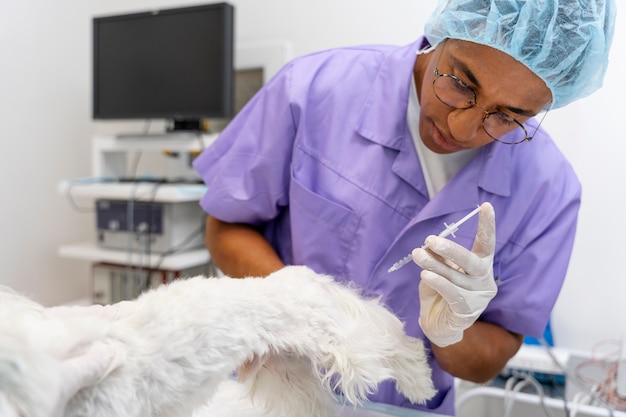Fall Toxins That Threaten Fishers Pets: Urgent Care Insights

Fall Toxins That Threaten Fishers Pets: Urgent Care Insights
As the crisp autumn air settles in around Fishers, many pet owners find themselves enjoying more time outdoors with their companions. Yet fall brings hidden dangers that can quickly turn a peaceful walk or backyard romp into an urgent situation. At VetCheck Pet Urgent Care Center - Fishers, our veterinary team sees a spike in cases involving fall pet toxins this time of year. Whether it is mushrooms sprouting after rain, spilled antifreeze in the driveway, or household products brought out for seasonal chores, these threats can lead to serious health emergencies.
This guide explains the most common fall pet toxins in Fishers, what symptoms to watch for, and when to seek immediate veterinary attention. You will also discover practical prevention tips, emergency vet advice, and how our urgent care veterinarians can help when toxic exposure strikes. Remember, our clinic at 14069 Mundy Drive, Fishers, IN 46038 is open during hours your regular vet may not be, and walk-ins are always welcome for emergencies. If you suspect your pet has ingested a toxin, do not wait; immediate care can make all the difference. Learn more about our emergency and urgent care services for pets in Fishers and how we support pet families throughout Fishers and surrounding communities.
Recognizing Fall Pet Toxin Exposure: Signs and Symptoms
Understanding when your pet may be in danger from fall pet toxins is crucial for a quick response. Many toxic substances cause non-specific or subtle symptoms at first, which can easily be mistaken for mild illness or digestive upset. Key symptoms of toxic exposure in dogs and cats include sudden vomiting or diarrhea, excessive drooling, weakness, tremors, confusion, loss of coordination, and seizures. Additionally, you might notice a refusal to eat, rapid breathing, coughing, or pale gums.
For instance, if your dog returns from a romp in the yard and soon develops staggering or vomiting, it may be more than just excitement; certain mushrooms or yard chemicals can trigger these reactions. Likewise, cats that suddenly hide, become lethargic, or develop dilated pupils after exploring a garage or basement may have encountered antifreeze or rodenticides. Some toxins, like those found in certain plants or moldy compost, can cause symptoms as mild as drooling or as severe as collapse. Because the signs can vary based on the toxin and your pet’s size, breed, and health status, any sudden change in behavior after possible exposure should be taken seriously.
Common Fall Toxins in Fishers: Why the Risk Increases
As leaves fall and temperatures drop, several seasonal changes increase the risk of pet toxin exposure in Fishers. Mushrooms, which thrive in damp autumn conditions, can appear overnight in parks, yards, and wooded areas. While many are harmless, some varieties contain potent toxins capable of causing liver failure, severe neurologic signs, or even death in pets. Since it is nearly impossible to distinguish toxic mushrooms from safe ones without expert knowledge, any ingestion should be considered dangerous.
Antifreeze is another serious concern during cooler months. This sweet-tasting liquid, used to winterize cars, is highly attractive to both dogs and cats. Even a teaspoon can be lethal, as antifreeze (ethylene glycol) causes rapid kidney failure. You might not realize your pet has licked a small puddle in the driveway or garage until symptoms appear hours later.
Other autumn hazards include rodenticides and pest control products brought out as rodents seek warmth indoors. These poisons are formulated to attract pests, but pets are just as likely to sample them. Ingestion can lead to internal bleeding, seizures, or organ damage, depending on the active ingredient. Additionally, fall-cleaning products, fertilizers, and even decorative plants can pose threats if pets chew or ingest them.
As you prepare your home and yard for colder weather, remember these products are more likely to be accessible to curious pets. The combination of increased outdoor exploration, seasonal cleanups, and changing wildlife patterns in Fishers raises the risk of encountering fall pet toxins.
Urgent Treatment for Fall Pet Toxins: What to Expect at an Urgent Care Vet
When a pet is exposed to a possible toxin, time is critical. Our veterinary professionals at VetCheck Pet Urgent Care Center - Fishers are trained to rapidly assess, diagnose, and treat toxic exposures. The first step often involves gathering a detailed history; knowing what your pet may have ingested, when, and how much can guide initial therapy. We use in-house diagnostics, such as blood tests and urinalysis, to identify organ damage or metabolic changes caused by toxins. For visible toxins on the skin or fur, decontamination with bathing or shaving may be performed.
Treatment approaches depend on the specific toxin but typically involve inducing vomiting (only when safe and indicated), administering activated charcoal to bind toxins, and providing intravenous fluids to support kidney and liver function. In the case of antifreeze or rodenticide ingestion, specific antidotes may be needed, and time is of the essence for effective intervention. Pets may require hospitalization for close monitoring, additional medications, or supportive care if organ failure or neurological symptoms are present.
Our urgent care veterinarians are equipped to manage a wide variety of toxic exposures, offering emergency vet advice and intervention when traditional clinics may be closed. Immediate action can mean the difference between a full recovery and severe complications, especially with potent toxins like antifreeze or certain mushrooms. If you are unsure about what your pet was exposed to, bringing any packaging, plant samples, or a photo of the suspected toxin can greatly assist in diagnosis and treatment.
For more details on how we help with toxic exposures, visit our Toxicology and Pet Poison Control services at VetCheck Pet Urgent Care Center.
Prevention: Keeping Your Pet Safe from Fall Toxins at Home
Preventing toxic exposures is always preferable to treating an emergency. As you enjoy the changing season, several simple practices can dramatically reduce risk. Begin by inspecting your yard and removing any mushrooms as soon as they appear, wearing gloves and discarding them in sealed bags to prevent pets from digging them out. Store antifreeze and all automotive products in tightly sealed containers, out of reach from pets, and clean any spills immediately. If you must use rodenticides or pest control products, opt for pet-safe alternatives and place them in areas inaccessible to both pets and wildlife.
When walking your dog through parks or wooded areas in Fishers, keep them on a leash and discourage foraging or chewing on unfamiliar items. Be vigilant during hikes, especially after rainfall when mushrooms are more abundant. Indoors, ensure that seasonal cleaning supplies, fertilizers, and holiday plants are stored securely. Supervise pets around compost bins and garbage, as moldy food and garden waste can also harbor dangerous toxins.
Education is also a powerful preventive tool; familiarize yourself with common fall pet toxins in Fishers and discuss any concerns with our veterinary team. If you are ever uncertain about a product or plant, err on the side of caution and keep it away from your pet.
When to Seek Emergency Veterinary Care for Toxin Exposure
Acting quickly in the face of possible toxin exposure is essential. You should immediately seek care from an emergency vet near me if your pet has ingested any unidentified mushroom, antifreeze, rodenticide, or household chemical. Additionally, if your pet develops sudden vomiting, seizures, loss of consciousness, difficulty breathing, or unusual behavior after being outdoors or near chemicals, do not wait for symptoms to worsen. Even if your regular veterinarian is closed, VetCheck Pet Urgent Care Center - Fishers is here for urgent care situations, with no appointment needed and walk-ins always welcome.
It is also important to remember that some toxins, like antifreeze, may initially cause mild symptoms that seem to resolve before severe organ damage occurs. Delaying care or waiting for obvious signs can be life-threatening. If you are ever unsure, call us or bring your pet in for an assessment; our urgent care veterinarians can quickly determine if treatment is needed.
For additional support, national resources such as the Pet Poison Help Line and ASPCA Poison Control provide expert information on pet toxic exposures, but professional veterinary care is always the safest choice for your pet’s health.
Your Local Partner for Fall Pet Toxin Emergencies in Fishers
Fall should be a season of safe fun and cozy moments with your pets, not a time for unexpected emergencies. At VetCheck Pet Urgent Care Center - Fishers, our veterinary professionals are dedicated to keeping your pets protected from the dangers of fall pet toxins in Fishers and surrounding communities. If you ever need emergency vet advice, rapid diagnostics, or urgent intervention, remember that walk-ins are welcome and immediate care is available when you need it most.
Should your pet encounter a fall toxin or if you notice any unusual symptoms after outdoor activity, do not hesitate to contact us at (317) 572-7557 or visit our 14069 Mundy Drive, Fishers, IN 46038 clinic. We are proud to be the emergency vet near me you can rely on for urgent pet care in Fishers throughout the year. For more information on our emergency and urgent care services for pets in Fishers or Toxicology and Pet Poison Control services at VetCheck Pet Urgent Care Center, explore our website or reach out any time. Your pet’s safety is our top priority, and we are always here to help—no appointment needed.


















